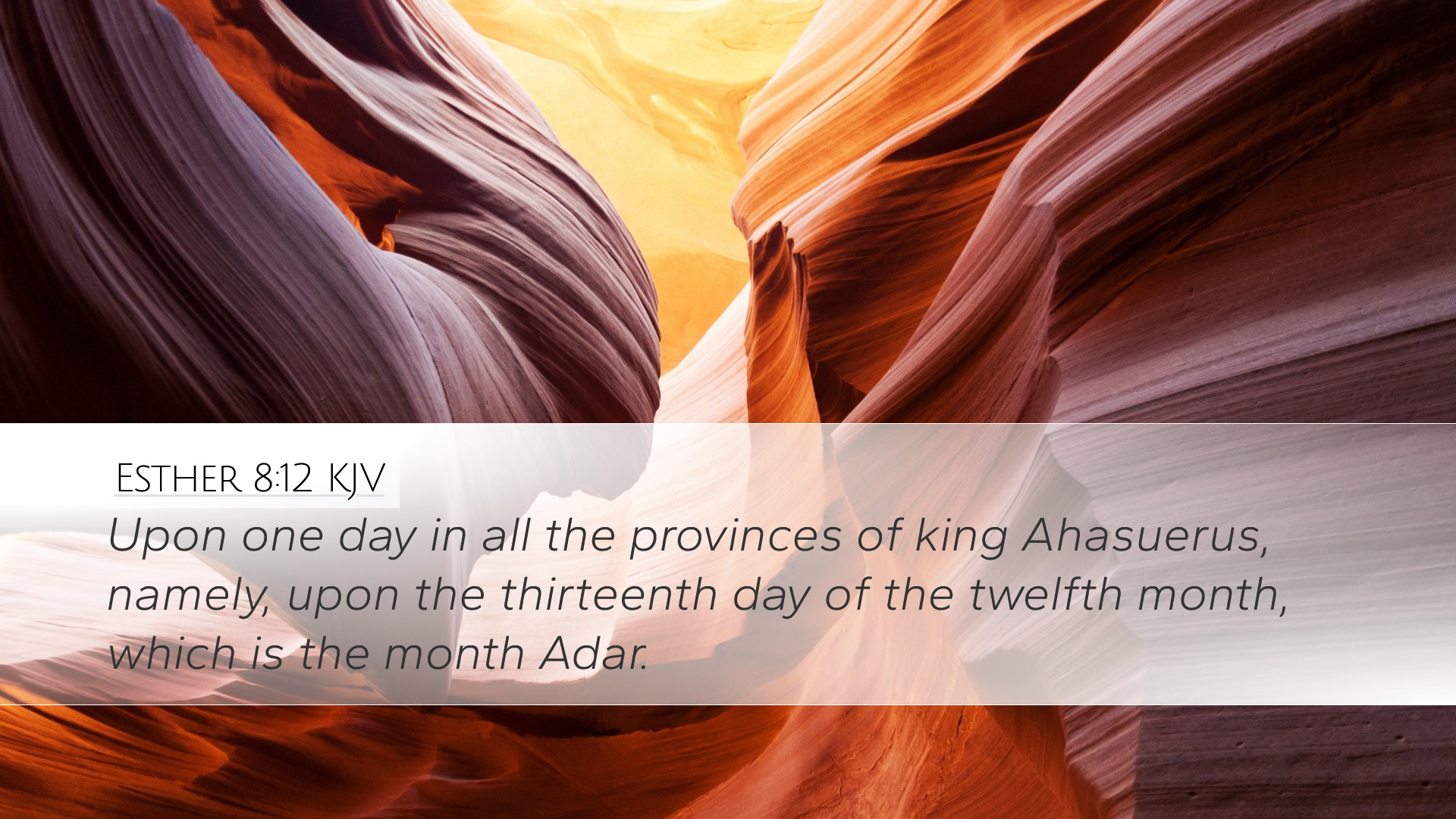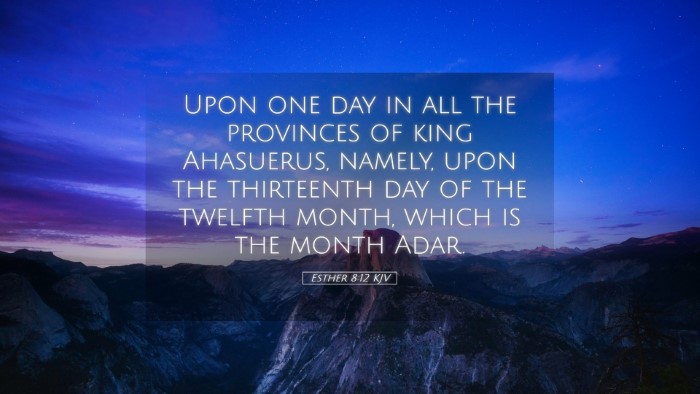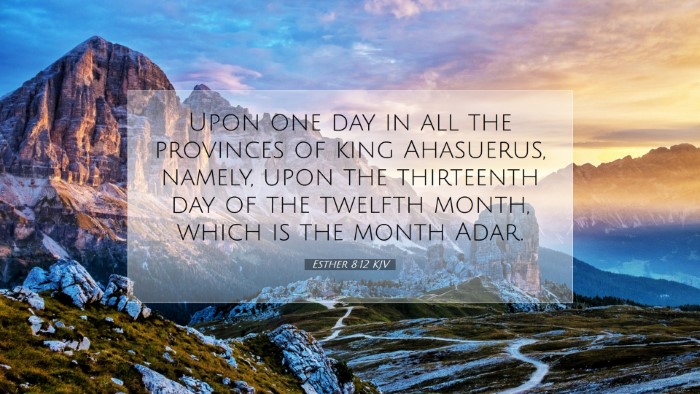Old Testament
Genesis Exodus Leviticus Numbers Deuteronomy Joshua Judges Ruth 1 Samuel 2 Samuel 1 Kings 2 Kings 1 Chronicles 2 Chronicles Ezra Nehemiah Esther Job Psalms Proverbs Ecclesiastes Song of Solomon Isaiah Jeremiah Lamentations Ezekiel Daniel Hosea Joel Amos Obadiah Jonah Micah Nahum Habakkuk Zephaniah Haggai Zechariah MalachiEsther 8:12
Esther 8:12 KJV
Upon one day in all the provinces of king Ahasuerus, namely, upon the thirteenth day of the twelfth month, which is the month Adar.
Esther 8:12 Bible Commentary
Commentary on Esther 8:12
Bible Verse: Esther 8:12 - "Upon one day in all the provinces of king Ahasuerus, namely, upon the thirteenth day of the twelfth month, which is the month Adar."
This verse marks a significant turning point in the Book of Esther, especially when we consider the overall narrative of salvation and deliverance of the Jewish people. Here, we shall explore various insights from notable public domain commentaries.
Historical Context
The context of Esther 8:12 is critical for understanding its implications. The Jews were under threat from Haman's decree, which ordered their destruction. In Esther 8, we see the aftermath of Haman's downfall and the pivotal moment when Queen Esther intervenes on behalf of her people. The granting of the right to defend themselves signifies not just survival but the formal recognition of their existence within the empire.
Insights from Notable Commentaries
Matthew Henry's Commentary
Matthew Henry emphasizes the thematic element of divine providence throughout the narrative. He points out that the dates mentioned in Esther 8:12 are not merely chronological markers but are laden with theological significance.
- Divine Timing: Henry highlights that God's timing is impeccable. The thirteenth day of the twelfth month signifies a significant change from despair to hope for the Jews.
- Celebration of Victory: He notes how this verse sets the stage for future celebrations (e.g., Purim), underscoring the importance of remembering God's deliverance.
Albert Barnes' Notes on the Bible
Albert Barnes offers a more detailed exegesis concerning the geopolitical and social implications of Esther 8:12. He addresses the decree's legal ramifications and the Jewish people's newfound capability to defend themselves.
- Legal Authority: Barnes discusses the authority given to the Jews to gather and defend themselves. This was a radical shift, empowering a previously oppressed group.
- Cultural Repercussions: He also reflects on how this decree enabled a form of Jewish identity to emerge within the empire, setting a precedent for their communal cohesion and identity.
Adam Clarke's Commentary
Adam Clarke provides a critical analysis of the significance of Haman's defeat and the creation of this new decree. He points to the grace of God evident in the reversal of fortunes for the Jewish people.
- Haman's Intent vs. God's Plan: Clarke contrasts Haman's wicked intentions with God's redemptive purposes, emphasizing how evil can be overturned.
- Jewish Resistance: He notes the significance of the Jews being able to prepare for resistance, interpreting this as a manifestation of their faith and courage.
Theological Themes
Esther 8:12 is rich in theological implications, which can be especially relevant for pastors and theologians.
- God's Sovereignty: The verse illustrates the sovereignty of God over human affairs. Despite Haman's decree, God's plan prevails.
- Redemption: It serves as a precursor to themes of redemption and deliverance, akin to the broader Biblical narrative of salvation.
- Hope in Despair: For students of the Bible, this passage encapsulates the hope that can emerge even in dire circumstances, promising that deliverance is possible.
Application for Today's Believers
In reflecting on Esther 8:12, modern believers can draw parallels to their own lives, recognizing that God’s providence remains active.
- Faith and Courage: The courage of Esther serves as a powerful message about the impact of individual faith and action in the face of adversity.
- Community and Identity: Believers are encouraged to reflect on their identity within the body of Christ and the strength of community, particularly during seasons of trial.
- Hope and Assurance: This verse reassures us of God’s ongoing work in the world, inviting believers to trust in His plans, irrespective of present circumstances.
Conclusion
Esther 8:12 is a profound verse within a narrative that demonstrates God's power to deliver and redeem. By synthesizing insights from Matthew Henry, Albert Barnes, and Adam Clarke, we gain a deeper understanding of its historical context, theological implications, and practical applications. As pastors, students, and scholars engage with this text, they are reminded that God's providence is not only a theme in Esther but a continuous thread throughout the entirety of Scripture.


